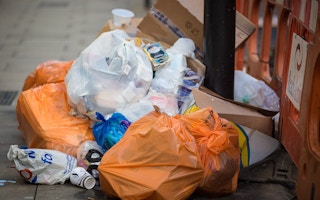Retailers in Singapore that make customers pay for plastic bags have seen a 60 per cent reduction in their use, according to a study by the World Wide Fund for Nature (WWF).
To continue reading, subscribe to Eco‑Business.
There's something for everyone. We offer a range of subscription plans.
- Access our stories and receive our Insights Weekly newsletter with the free EB Member plan.
- Unlock unlimited access to our content and archive with EB Circle.
- Publish your content with EB Premium.
Eight retailers in the study, including pharmacy chain Watsons, cosmetics chain The Body Shop, and fast fashion brand H&M, have seen plastic bag consumption drop by a total of 300,000 carriers a month since introducing a fee.
These retailers have made pledges to reduce plastic use in support of Plastic ACTion (PACT), a voluntary business initiative managed by WWF.
Helen Khoo, executive director of Wing Tai Retail, which introduced a S$0.10 charge for a plastic bag at its G2000, Topshop, Topman, and Dorothy Perkins outlets, said the charge has been effective in discouraging the use of single-use bags and has proven to be “a crucial step” towards reducing pollution.
However, Singapore’s 60 per cent reduction is among the smallest seen after the introduction of a fee. Larger reductions were seen in China, the Philippines, Brazil, South Africa, Ireland, Wales, Portugal, and the Netherlands, with the biggest fall witnessed in England (a 94 per cent drop).
The relatively small drop in Singapore could be explained by the Covid-induced reliance on single-use plastic. Katherine Desbaillets, co-owner of healty eating chain SaladStop!, said that because of Covid-19 restrictions, most sales have been made through online deliveries, which meant the use of disposables has been virtually unavoidable.
“It has been hard to make any meaningful comparisons [of plastic use] with last year, because everything has gone out through delivery… We have no choice,” she told Eco-Business.
SaladStop! charges 10 cents for a plastic bag at its stores, but packaging for online deliveries is free. In store, SaladStop! has seen an 82 per cent reduction in plastic bag use since introducing a charge — the biggest drop of the eight retailers in the study.
Some retailers have been more conservative with plastic bag charges, with local pharmacy Watsons only charging for bags once a week. Cosmetics retailer The Body Shop charges for carrier bags daily, while fashion brand Uniqlo has phased out plastic bags altogether, replacing them with “eco-friendly” paper bags.
Plastic bags make up about a fifth of Singapore’s plastic waste stream. Singapore residents use an average of 13 plastic bags a day and produce more plastic waste per capita than almost any country in Asia, a small fraction of which is recycled.
Many retailers in Singapore have long been resistant to charging for plastic bags for fear of losing customers. NTUC Fairprice, the country’s largest supermarket chain, has been running a bag charge trial at select stores, but has been reluctant to roll out the fee nationwide.
WWF said that while many retailers had shown interest in introducing a charge, factors that put them off have included the fear of consumer backlash, the perception that retailers were generating additional revenue from a fee (although most donate the proceeds to charity), and the fear of being at a competitive disadvantage.
The environmental group said it hoped that introducing a charge would persuade more consumers to bring their own reusable bags.
The bring-your-own (BYO) container movement has been growing in popularity in recent years, but has been set back by the Covid-19 pandemic, which has led to a resurgence in single-use plastic use amid fears reusable containers pose a contagion risk.
Singapore’s BYO campaign, led by waste reduction group Zero Waste SG, was recently extended to the country’s popular hawker eateries, which consume huge volumes of plastic for takeaways.
Zero Waste SG executive director Pek Hai Lin has said that Singaporeans tend to regard plastic bags as “a right, not a privilege”. Many residents depend on bags to dispose of wet waste down high-rise apartment rubbish chutes, which has long been a pain point for plastic bag charging schemes.










